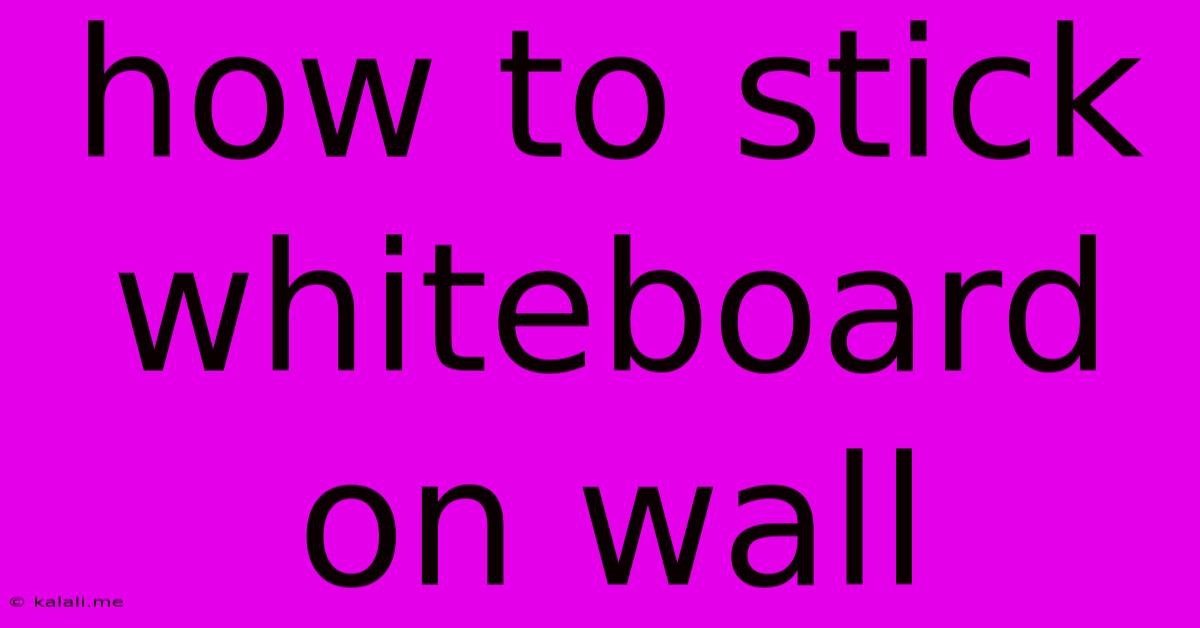How To Stick Whiteboard On Wall
Kalali
Jun 09, 2025 · 3 min read

Table of Contents
How to Stick a Whiteboard to Your Wall: A Comprehensive Guide
Meta Description: Learn how to securely and effectively mount a whiteboard to your wall, covering different methods, materials, and considerations for a lasting installation. We'll cover everything from choosing the right adhesive to using screws for a truly secure hold.
Sticking a whiteboard to your wall might seem straightforward, but choosing the right method ensures a secure and long-lasting installation. The best approach depends on several factors, including the whiteboard's size and weight, your wall type (drywall, plaster, brick, etc.), and your desired level of permanence. Let's explore the various options available.
Assessing Your Whiteboard and Wall
Before you begin, carefully assess your whiteboard and wall. Consider these factors:
- Whiteboard Weight: Heavier whiteboards require more robust mounting solutions. Lightweight whiteboards might suffice with adhesive strips, while heavier ones may need screws.
- Wall Type: Drywall requires different mounting techniques than brick or plaster walls. Drywall is particularly susceptible to damage if not handled correctly.
- Surface Texture: Uneven or textured walls can affect the adhesion of adhesives. Smooth surfaces generally provide the best grip.
- Whiteboard Material: The material of your whiteboard itself will influence which methods are appropriate. Some materials are more prone to damage than others.
Methods for Sticking a Whiteboard to the Wall
Here are several reliable methods for mounting your whiteboard:
1. Adhesive Strips:
- Best for: Lightweight whiteboards and smooth surfaces.
- Process: Clean the wall thoroughly. Apply heavy-duty adhesive strips according to the manufacturer's instructions. Attach the strips to the back of the whiteboard and press firmly against the wall.
- Pros: Easy installation, no tools required, removable (though may leave residue).
- Cons: Not suitable for heavy whiteboards or uneven walls; adhesive may fail over time or with excessive weight. Consider using multiple strips for added security.
2. Double-Sided Tape:
- Best for: Lightweight to medium-weight whiteboards and smooth surfaces.
- Process: Similar to adhesive strips, ensure the surface is clean and dry. Apply the double-sided tape to the back of the whiteboard, ensuring even coverage. Press firmly against the wall.
- Pros: Strong adhesion, relatively easy to apply.
- Cons: Not ideal for heavy whiteboards or textured walls. Removal can be challenging and might damage the wall or whiteboard.
3. Command Strips:
- Best for: Lightweight whiteboards, offering a balance of holding power and easy removal.
- Process: Command Strips are specifically designed for easy removal with minimal damage. Follow the manufacturer's instructions for proper application.
- Pros: Removable with minimal residue, good for renters or temporary installations.
- Cons: Not suitable for heavy whiteboards or long-term use.
4. Screws and Wall Anchors:
- Best for: Heavy whiteboards and all wall types. This offers the most secure and long-lasting solution.
- Process: Locate wall studs for optimal support. If studs are unavailable, use appropriate wall anchors for your wall type (drywall anchors, plastic anchors, etc.). Drill pilot holes, insert anchors (if necessary), and secure the whiteboard with screws. Consider using a level to ensure the whiteboard hangs straight.
- Pros: Most secure method, suitable for all wall types and whiteboard weights.
- Cons: Requires tools and some DIY skills; may leave holes in the wall upon removal.
Choosing the Right Method: A Summary
| Method | Weight Capacity | Wall Type | Ease of Installation | Permanence | Removal Difficulty |
|---|---|---|---|---|---|
| Adhesive Strips | Low | Smooth | Easy | Low | Easy |
| Double-Sided Tape | Medium | Smooth | Easy | Medium | Moderate |
| Command Strips | Low | Most | Easy | Low | Easy |
| Screws & Anchors | High | All | Moderate | High | Moderate to High |
Remember to always prioritize safety. If you're unsure about any step, consult a professional for assistance. Proper installation ensures your whiteboard stays securely in place and avoids potential damage to your wall or injury. By carefully considering the weight, wall type, and your personal skillset, you can choose the most effective method for sticking your whiteboard to the wall.
Latest Posts
Latest Posts
-
How To Keep Rugs From Slipping
Jun 09, 2025
-
Use The Steam Mobile App For Two Factor Authentication Badge Problem
Jun 09, 2025
-
How Long Do Washed Eggs Last Unrefrigerated
Jun 09, 2025
-
Does Prayer Break When In Sajda With Close Eyes
Jun 09, 2025
-
How Do You Dispose Of Mineral Spirits
Jun 09, 2025
Related Post
Thank you for visiting our website which covers about How To Stick Whiteboard On Wall . We hope the information provided has been useful to you. Feel free to contact us if you have any questions or need further assistance. See you next time and don't miss to bookmark.